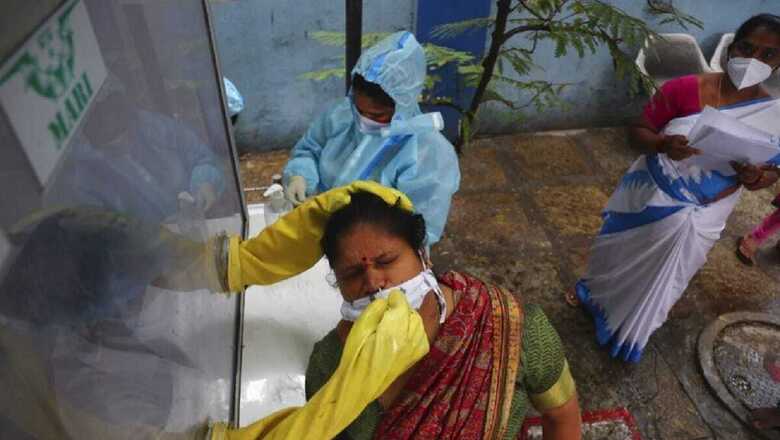
views
More than 7,000 SARS-CoV-2 mutations have been documented but that doesn’t translate to variants, say scientists, emphasising the distinction between the two and cautioning that the spike in cases in some states is likely due to non-adherence of COVID-19 appropriate behaviour. If safety protocols are not followed, new versions that can spread faster or dominate the previous version could emerge, they warned as worries mounted over a recent study showing 7,684 mutations in the SARS-CoV-2 genome in India.
Though the study from Hyderabad’s CSIR-Centre for Cellular and Molecular Biology is alarming and led to panic in some quarters, some mutations are only to be expected. According to Rakesh Mishra, CSIR-CCMB director and study co-author, 7,684 mutations in the SARS-CoV-2 genome were documented from the data analysis of 6,017 genomes sequenced so far.
That doesn’t mean 7,000 variants are going around in the country. This only shows that the virus is mutating as expected, and we have documented what these mutations are, Mishra told PTI. He added that it is difficult to say right now how many variants there are in the country.
A mutation means a change in a nucleic acid base or amino acid molecule, and a virus containing this change is termed a mutant, explained virologist Upasana Ray. Mutations eventually accumulate to generate variants that differ from the original virus more and more, and so, a variant can have limited or even cumulative mutations, she added.
While it is not surprising to find many new mutations, it is important to sequence and document them, said the senior scientist at Kolkata’s CSIR-Indian Institute of Chemical Biology. Not all mutations would even linger around in the population for long. Some remain, some fade off, Ray told PTI. Mutation is not unique to SARS-CoV-2, she said. The longer a virus stays in the population and spreads, the more the mutations and hence more variants. If a virus attains a significant degree of change from its original form so that there is a major change in antigenic epitopes, it has a chance to escape the immunity offered by the existing vaccines, Ray said. An epitope is the part of virus cellsthat is recognised by the immune system.
The analysis by CSIR-CCMB found that novel variants worrying many countries globally have so far only low prevalence in India. These include the variants with the immune-escape E484K mutation and the one with the N501Y mutation found to have a higher transmission rate. While the E484K mutation is found in both the South African and Brazil variant lineages, the N501Y mutation is found in the UK variant. But the low prevalence in the country might be simply because not enough sequencing has been done, the authors of the study said, calling for robust sequencing of coronavirus genomes across India. Noted virologist Shahid Jameel said there are currently 5,261 SARS-CoV-2 sequence entries from India in the GISAID database, a global science initiative that provides genomic data of the coronavirus responsible for the COVID-19 pandemic.
With 11 million confirmed cases, that is a sequencing rate of under 0.05 per cent, Jameel, director, Trivedi School of Biosciences, Ashoka University, told PTI. In his view, there isn’t enough information on mutations, especially variant lineages in India, due to low sequencing.
In the absence of that, I would say the surge is most likely due to non-adherence to COVID appropriate behaviour, Jameel added. There are only four patients from Maharashtra recently in whom a mutation called E484Q has been seen. This change is not as drastic as E484K, which is found in the South African and Brazil variant lineages.
Since clinical and epidemiological correlations have not been done yet, we can’t say if this is the cause of rising cases. Unless we see more of this, four cases are not enough to make that claim, Jameel said. He, however, cautioned that it is important to understand that more transmission will increase the chances of mutations developing.
So Covid appropriate behaviour also cuts down on the development of variant viruses, he said. Mishra agreed that the current surge in certain states is less likely due to some new variant, and more likely due to people ignoring COVID protocols.
I don’t see any recent superspreader events till now, because whatever sequencing has been done doesn’t point to any new fast-spreading variant in the country, he added. Mishra also emphasised that the findings do suggest the likelihood of new variants arising if continuous mutations in the virus genome are discovered.
Sequencing of the genome to look for mutations is to keep a track of the virus genome so as to check what this will hold for vaccine and drug efficacy. For example, the UK variant has around 17 mutations in its genome, he said. Ray said even vaccination can put a virus under stress and change it to a form (variant) that can evade the immune response, adding that the chance of this is low if mass immunisations are done faster.
According to Jameel, a mutation is a normal consequence of a virus multiplication, but it is hard to say what is a normal number. The spike protein changes — due to mutation in the spike gene — have not shown anything that would compromise vaccine efficacy, he noted.
The spike protein helps the virus enter human cells. There has been a rise in the number of daily infections in five states: Maharashtra, Kerala, Chhattisgarh, Punjab, and Madhya Pradesh in the past few days. Of these, Maharashtra and Kerala are the most worrying, accounting for about 75 per cent of the total active COVID-19 cases in the country. The N440K and E484Q variants of SARS-CoV-2 have been detected in Maharashtra, Kerala, and Telangana. Also, three other mutated strains — one each from the UK, South Africa, and Brazil are already present in the country, NITI Aayog Member (Health) V K Paul said in a press conference in New Delhi on Tuesday. But there is no reason for us to believe presently, on the basis of scientific information, that they are responsible for the upsurge of the outbreak in some districts of Maharashtra and Kerala, Paul said. With 13,742 new infections, India’s COVID-19 count has gone up to 1,10,30,176 while recoveries are at 1,07,26,702, according to Union Health Ministry data updatedon Wednesday.
There are 1,46,907active cases of coronavirus infections in the country, whichcomprises1.33 per cent of the total caseload, the data stated.
Read all the Latest News, Breaking News and Coronavirus News here



















Comments
0 comment